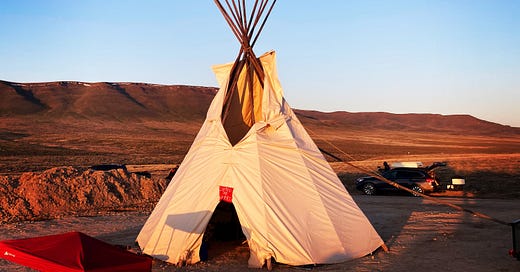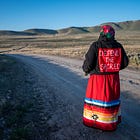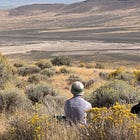The Scientific, Dispassionate Racism of Lithium Americas Corporation
When worldviews collide, planet and people pay the price for ethnocentric arrogance
Welcome to Biocentric, a newsletter focused on sustainability, greenwashing, and building a resistance movement to defend the planet. I’m Max Wilbert, co-founder of Protect Thacker Pass and co-author of ‘Bright Green Lies: How the Environmental Movement Lost Its Way and What We Can Do About It.’ Biocentric subscriptions are free, but paying for a subscription supports the community organizing work you read about here, and gets you access to behind-the-scenes information and unreleased drafts.
Note: today is the 3-year anniversary of Protect Thacker Pass.
The term “racism” brings to mind bigots, slurs, and the Klu Klux Klan, or the systematic disenfranchisement of certain communities through discriminatory policies around housing, banking, and policing.
When we think of environmental racism we often think of what is happening in Flint, Michigan, where a majority-Black community has faced a toxic water mismanagement crisis leading to lead poisoning.
Or, we think of “Cancer Alley,” an 85-mile stretch along the Mississippi River in Louisiana along which, according to the United Nations, an “ever-widening corridor of [150] petrochemical plants has not only polluted the surrounding water and air, but also subjected the mostly African American residents in St. James Parish to cancer, respiratory diseases and other health problems.”
But today I want to write about a different type of environmental racism; one that is more subtle, and perhaps more far-reaching.
***
Three years ago today, my good friend Will Falk and I traveled to Thacker Pass, Nevada, and set up camp high on the side of a mountain, on the GPS coordinates of a planned open pit lithium mine.
We were there to protect the land, and within months, we began developing relationships with traditional indigenous people from the Northern Paiute and Western Shoshone tribes. Soon, community members from Fort McDermitt, Reno-Sparks, Summit Lake, Duck Valley, Yerington, and other Native American reservations were regularly traveling to the protest camp, bringing supplies, and standing on the front lines.
A profound kinship began to develop. We’d sit on the mountainside with elders, discuss strategy, share food, and watch the land. Golden eagles wheeled overhead and jackrabbits ran through the sage.
One particular elder, Josephine Dick from the Fort McDermitt Tribe, has a twinkle in her eye that reminds me of my grandmother. She would tell stories about tanning hides, about making cradleboards for babies, about the history of Peehee Mu’huh (the Paiute name for Thacker Pass). She speaks about how, one day, we’re not going to have cars, or electricity, or phones, or any modern technologies. "One day," she says, "that’s all going to be gone. And people will have to know the old ways."
While at Thacker Pass, I spent time reading documents detailing the government's attempts at consultation with native tribes. One of them is the transcript of a meeting with government officials in nearby Winnemucca attended by Josephine, among other tribal members.
“We have blood, a heart, organs, keeping us alive,” Josephine tells the Bureau of Land Management officials. “Mother Earth has water, soils, rocks, keeping her alive. To me, the more Mother Earth is mined, it is slowly killing her, and creating problems in the world. She needs her parts the way we do.”
***
There are different ways to live in the world. One is Josephine’s way: a way that sees land as sacred, sees animals as relatives who are our elder siblings, and sees water and the basis of all life. This is traditional in Paiute society, and it’s also traditional among my own ancestors, before they assimilated or were conquered by empires.
In fact, this worldview is shared amongst almost all tribal and land-based societies around the globe.
Nemonte Nenqiumo, a Waorani leader from the Ecuadorian Amazon, lives 4,000 miles from Paiute territory, but in her brilliant 2020 essay My Message to the Western World: Your Civilization is Killing Life on Earth, she shares a similar perspective: “This forest has taught us how to walk lightly, and because we have listened, learned and defended her, she has given us everything: water, clean air, nourishment, shelter, medicines, happiness, meaning.”
She continues: “You forced your civilization upon us and now look where we are: global pandemic, climate crisis, species extinction and, driving it all, widespread spiritual poverty.”
Ati Quigia, an indigenous leader from Columbia, said it even more clearly: “We are fighting not to have roads or electricity — this vision of self-destruction that’s called development is what we’re trying to avoid.”
From a scientific perspective, you could say this worldview is common because sustainability is an adaptive trait, and an “animist” perspective promotes sustainability. Or, you could say that this worldview is a more accurate way of perceiving the world than a purely mechanistic, western perspective.
Both of these interpretations are true. My direct experience at Thacker Pass is that the land itself is alive, sentient, with feelings and perceptions far different from our own. But if we listen, the land speaks.
Compare the worldview of Josephine and Nemonte Nenquimo to our opponent.
Set against us at Thacker Pass is Lithium Americas, a transnational corporation based in Canada and operating through a fully-owned U.S. subsidiary, Lithium Nevada. They are traded on the New York Stock Exchange and the Toronto Stock Exchange, and have attracted major investors from around the world. The company is worth billions, and is collaborating with General Motors Corporation to develop the Thacker Pass lithium mine.
The mine, which is now under construction, will consist of an open pit nearly two miles long and half a mile wide, as deep as the height of a 35-story building, carved into the side of the mountain. New mountains have begun to rise, made up of the toxic acidic byproducts of the mining process. A sulfuric acid plant is under construction, which will use sulfur from the oil industry — possibly the Alberta Tar Sands — to burn lithium from the soil.
All this is only possible by first destroying the land with huge bulldozers, blowing up the mountain with explosives, and killing or driving away every single plant and animal. The scale of pollution, water use, and greenhouse gas emissions for a project like this is staggering.
Corporate power is a major driver of our environmental crisis. Global warming, species extinction, biodiversity loss, soil erosion, toxic pollution, plastic and chemical contamination, oceanic dead zones, overconsumption, urban sprawl, deforestation, desertification, sea level rise, ocean acidification, aquifer drawdown, overfishing — all of these problems are linked to corporate overreach. They are also all linked to abuse of human rights, declining human health, and threats to the future of our children.
***
Ethnocentrism refers to evaluating other peoples and cultures according to the standards of one's own culture. It’s also perfectly descriptive of Lithium Americas: a foreign corporation (foreign to both the Paiute nation and to the United States) imposing its vision of “development” on a population that opposes it, through the use of force.
That force is often filtered through intermediaries. At Thacker Pass, the United States government is serving Lithium Americas Corporation, both by protecting the mine in the courts, and by using its police forces to arrest native land protectors and fine Will Falk and I $49,890.13 for providing a latrine to native elders
Similarly, in Argentina, indigenous and non-native communities fighting lithium mines face kidnapping, torture, and sexual assault at the hands of Argentine police forces. This includes the lithium extraction project developed by Lithium Argentina (a corporation which was until recently part of Lithium Americas, until they split to allow greater access to government subsidies).
Violent, repressive techniques are being applied in Nevada, on Paiute-Shoshone land at Thacker Pass. This week, the chairman of the Fort McDermitt Tribe (which took money from the mining company against community wishes) physically attacked and choked a member of his tribe — an 18-year-old boy — who attempted to film his meeting with Lithium Americas employees Tim Crowley (VP of Government and External Affairs) and Maria Anderson (Community Relations Director).
I believe this is the second time this Chairman has physically attacked a mine opponent. The other incident was captured by the New York Times (the photo is inaccurately labeled as Tildon Smart).
Mining companies use divide-and-conquer strategies to split communities apart and weaponize them against each other. Another way companies shut down dissenters is lawsuits. Four indigenous activists and three allies (including me) are being sued by Lithium Americas for our work to #ProtectThackerPass, a sacred and biodiverse place now being bulldozed for mining. We face the possibility of massive financial penalties.
The ethnocentric racism of Lithium Americas corporation and others like them claims that their vision of economic and technological development is the solution to the world’s problems. These companies believe that wildlife habitat, water, and the sacred places of traditional indigenous communities are less important than profits and the development of electric cars. And their vision of “progress” leads to mad hypocrisies; “Mining is inherently unsustainable,” says Thomas Benson, Vice President of Global Exploration at Lithium Americas — before he goes back to his well-paid job in mining.
Ethnocentric racism leads to Lithium Americas stock boosters saying things like this: “No natives equals few water issues. Natives can be a royal pain to deal with. Lithium Americas has had its fair share of native issues for its South American mine (and the same can be said for Thacker Pass in Nevada) but these are to be expected. Still, not having any natives is a welcome bonus.”
This is the language of colonization and genocide.
Ethnocentric racism leads Thacker Pass supporters to disparage Native American resistance to the destruction of Peehee Mu’huh, a ceremonial site where Paiute ancestors were massacred, as “horses” in response to a ceremonial prayer horse ride, as shown here on social media:
There is a circular relationship between economics and oppression.
In his book Capitalism and Slavery, Trinidadian historian Dr. Eric Williams writes that “Slavery was not born of racism: rather, racism was the consequence of slavery.” Williams argues (as have others) that racism developed as an ideology to justify subjugation that was already in progress for economic reasons. In other words, exploitation for economic growth or power came first, and racism developed later, as a moral system to justify the exploitation.
The economic drivers behind Thacker Pass are titanic. According to the International Energy Agency World Energy Outlook report in 2021, "If the world gets on track for net zero emissions by 2050, then the cumulative market opportunity for manufacturers of wind turbines, solar panels, lithium-ion batteries, electrolysers and fuel cells amounts to USD 27 trillion. These five elements alone in 2050 would be larger than today’s oil industry and its associated revenues." (emphases added).
As Stan Cox has written:
Globally, mining and processing of metallic ores has doubled just since 2000 and is responsible for a whopping 10 percent of total world energy consumption. Now, if plans to “electrify everything” are carried out worldwide, the tonnage of metal extracted and processed in the next 15 years alone will exceed the tonnage that humans have produced during the 5,000 years since the start of the Bronze Age.
The Washington Post, citing International Energy Agency figures, predicts that by 2040, global demand for metals that go into batteries will balloon 20-fold for nickel and cobalt and 40-fold for lithium; demand for manganese, critical for wind turbines, will increase ninefold in just the next decade. Demand for aluminum, which is already produced in vastly larger quantities than any of those metals, will increase by yet another 40 percent, largely to produce lighter-weight electric cars and support solar arrays.
Forbes estimates that almost 400 new mines will be opened worldwide by 2035 just to keep battery factories supplied with cobalt, lithium, and nickel. This will create many more of what have come to be known as “green sacrifice zones”: localities across the world, from Congo to Guinea to China to Bolivia to the Pacific Ocean, that are bearing or will bear the human, environmental, and socioeconomic costs of the transition to non-fossil energy. And the deployment of wind and solar power plants across the world’s windier and sunnier regions will mean converting vast stretches of the Earth’s land surface and even seabeds into industrial energy farms.
Derrick Jensen builds on the insights of Dr. Williams. He writes: “hatred felt long enough and deeply enough no longer feels like hatred. It feels like economics, or religion, or tradition, or simply the way things are.” The hatred required to build 400 new mines and call it “progress” is enormous.
The result of this hatred is the profoundly dispassionate, scientific racism that animates corporations like Lithium Americas. It doesn’t look like the racism of the Klu Klux Klan, or the environmental injustice of Flint, Michigan. But it’s far more mainstream; sequential Republican and Democratic administrations have backed Lithium Americas, defending the project in Federal Court against tribes and environmental groups.
And they are not only defending a mine; they are defending the process of assimilation. They are defending the conquest of an Earth-centered worldview by a profit-centered one.
This is the continuation of an ongoing process. In the spring and summer of 1865, as the Snake War raged throughout Nevada between United States government and the Paiute and Shoshone, the highest military officer in the State wrote that Indians had “prevented the settlers along the Humboldt from putting in their crops, retarded the settlement of the rich agricultural lands of that section, [and] prevented the development of the rich mineral resources of the whole northern portion of our state…”
Mining vs. indigenous people and the land has been a recurring theme in Nevada for more than 158 years, from the Snake War to the Dann Sisters and Mount Tenabo to Thacker Pass.
***
Today, three years after I first set up camp at Thacker Pass, I remember Grandmother Sagebrush, an ancient shrub under whose branches I first dreamed about protecting Thacker Pass from an open pit lithium mine.
In my mind, I walk north from the protest camp we established on January 15th, 2021, towards the fenceline where Grandmother Sagebrush grows. The clouds fade from red to orange to purple, then green and a dark blue. Coyotes howl from the far mountain, echoing in the still air.
In my mind, I approach Grandmother Sagebrush, and something cracks inside me. I stumble onto my hands and knees and burst into tears. The grief pours out, my blessing to the land. Like many grandmothers, she has power over tears.
I do not know if she is alive or dead at this moment. If I visit the land, I can be charged with a felony.
I spend my days researching what is being done to the planet —the mining, the fracking, the clearcuts, the species disappearing one after another. A hundred today. A hundred yesterday. A hundred the day before. And, I try to throw myself on the gears of the machine, to slow it down, grind it to a halt, tear it apart.
Every day this work tears my soul apart and stitches it back together again. But the alternative is dissociation — a normal state of being inside our dysfunctional culture, and a state which is fundamental to “othering” and committing violence against other people, and against the land.
***
I recall another walk on the mountainside at Thacker Pass. On that day, I am not alone; a writer joins me. She asks questions, but not the normal ones. She is more interested in me than in lithium.
She asks, "Why don't you give up? Why don't you go home and sit on your couch and complain, like most people do? Why are you here?"
"Because I'm in love," I told her. "I am in love with the land. And you don't give up when you're in love."
In honor of Martin Luther King Jr. Day, as we consider the perils of greenwashing and Bright Green Lies, I want to share this quote. Originally meant as a commentary on capitalism, militarism, and the moral decline of the United States, it is just as cautionary when we consider the project of eco-modernism.
“We have fought hard and long for integration, as I believe we should have, and I know that we will win. But I've come to believe we're integrating into a burning house.”












Max, you capture the importance not only of informing our populace but WHY the love for the land is so important -where will all be in 6 years. :"they are not only defending a mine; they are defending the process of assimilation. They are defending the conquest of an Earth-centered worldview by a profit-centered one." Why does it always have to be humans vs other living creatures? And why don't we see that? Your writing is superb, btw.
Another, applicable, Martin Luther King Jr. quote to add to yours:
Cowardice asks the question, "Is it safe?" Expediency asks the question, "Is it politic?" And Vanity comes along and asks the question, "Is it popular?" But Conscience asks the question, "Is it right?" And there comes a time when one must take a position that is neither safe, nor politic, nor popular, but he must do it because Conscience tells him it is right. - Martin Luther King. Jr.